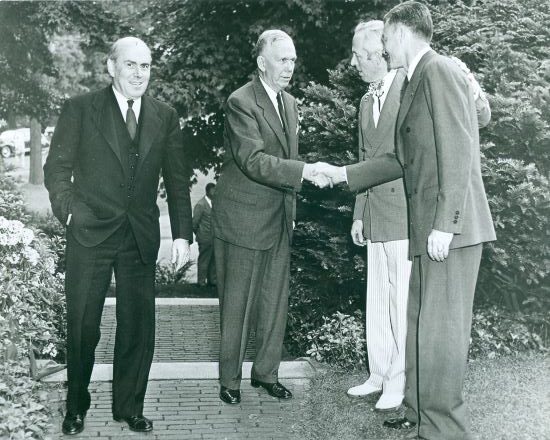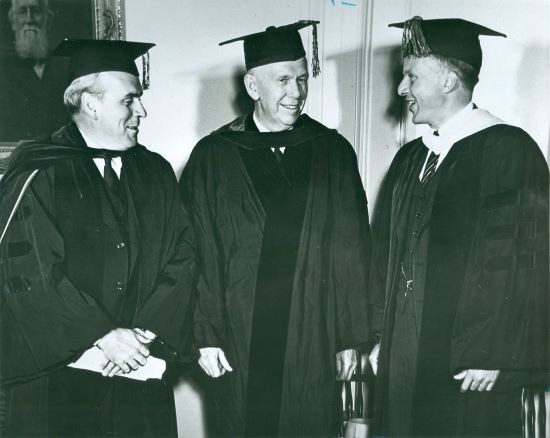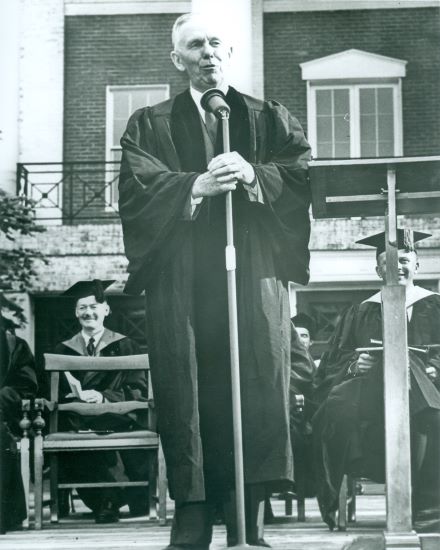Before George Marshall settled on Harvard University as the venue for his speech about the European Recovery Program, he had considered Amherst College but rejected the idea because its June 16, 1947, commencement date was too late. However, John J. McCloy, an Amherst alumnus, pressured Marshall to accept an honorary degree from Amherst. McCloy was an American lawyer, diplomat, banker, and a presidential advisor. He served as assistant secretary of war during World War II under Henry Stimson and was head of the World Bank. Marshall agreed to accept the Amherst degree after McCloy promised him that he would not have to make a speech.
Marshall’s recounting the Amherst experience to Forrest Pogue in an interview on November 15, 1956, shows an aspect of Marshall that may seem surprising.
Marshall and McCloy arrived at Amherst the morning of the commencement and attended a reception at the home of a dean. “The dean’s wife served us scotch, and I had three scotches,” Marshall recounted. “I never drink scotch. In fact, I never drink much of anything. But I sat there laughing with them and drank three scotches.”

Secretary of State Marshall with John J. McCloy and President of Amherst College, Dr. Charles W. Cole, on occasion of award of honorary L.L.D.
With those “three scotches aboard,” as Marshall so quaintly put it, they went to the outdoor ceremony on campus. Someone led Marshall to his seat next to the college president on the front row and handed him a printed program. The processional was first, followed by a prayer by the chaplain. The third item: “Address by George Catlett Marshall, Secretary of State.”

Secretary of State Marshall in academic regalia for presentation of an honorary degree from Amherst College.
Telling the story to Pogue, Marshall chuckled and said, “I was told I would not have to make a speech, and there I sat with three scotches aboard. That was the darnedest dilemma I ever got into.” He turned to look at McCloy, who “just shriveled all up.” Marshall recalled that he sat there hoping that the chaplain would make a long prayer so that he could have time to think about what to do. Those hopes were dashed, Marshall remembered, because the prayer was only one sentence long.

Secretary of State Marshall speaking at the reception of an honorary degree from Amherst College.
Marshall remembered that he had been told that there were veterans in the graduating class. “I proceeded to talk to the veterans,” he said, “and apparently I made one of the best talks I have ever made with those three scotches aboard.”
Marshall’s speech was reported on June 16 in The New York Times with a headline saying, “Marshall Calls on Vets for Support in Obtaining a Lasting Peace.” He noted that eight million Americans had served “everywhere on the face of the globe” in World War II and came home after learning “great lessons in life.” He admitted that he would have been surprised if 50% of them had gone on to college upon returning but was glad to report that the figure was closer to 90%.
“You and others like you are going into the American public with a new conscience,” he told the GI vets, and he asked them “to employ what experiences and what knowledge they had acquired to help assure peace in the world.”
Tom Bowers is the former docent director at George Marshall’s Dodona Manor in Leesburg, Virginia. He was professor and dean of the School of Journalism and Mass Communication at the University of North Carolina at Chapel Hill from 1971 to 2006.
